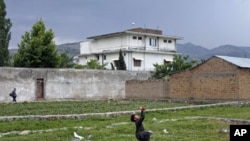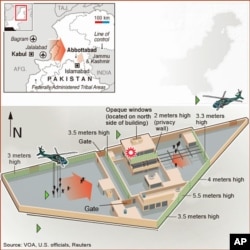Hillary Clinton says combat in Iraq and Afghanistan helped hone the SEAL Team Six assault on Osama bin Laden's compound one year ago.
Recounting that night, the U.S. Secretary of State recalls a Special Forces officer speaking with administration officials outside a small room under the White House.
"This may sound really exotic and scary to you all, but we've probably done something similar to this - helicopter in, take the target, look for who you're after, and get out of there - we have probably done it now 1,000 times," said Clinton.
Walking through various scenarios
Even with that experience on the ground, Clinton said President Barack Obama's advisors worked through every contingency they could think of in assessing the bin Laden raid: What if something went wrong with the helicopters, like in the failed effort to rescue hostages in Iran in 1980? When was the next moonless night? What would Pakistan do?
"We did our very best to try to give the president our honest assessment," Clinton said. "Ultimately it was his decision. Which I fully supported because I believed that we had to take the risk - and it was a risk - that that large house in Abbottabad was the haven for Bin Laden."
Clinton discussed the assault in an appearance at the U.S. Naval Academy. Uniformed men and women listened politely to her lecture on strategy in the Asia-Pacific region. But they sat forward in their seats when she was asked about her thoughts on the night of bin Laden's death.
"We were attacked. And one of my goals as a senator and then as a Secretary of State was to do everything I could to try to bring bin Laden to justice," she said.
Identifying Pakistan as haven
She recalled her first visit to Pakistan as secretary of state in 2009.
"I can't believe that there isn't anybody in the Pakistani government who doesn't know where Bin Laden is. And that caused a little bit of a ruckus. But I believed that somebody had to of known where he was," said Clinton.
When the U.S. intelligence community ran down the trail to Abbottabad, Clinton said a very small group began discussing whether to launch an air or a ground assault.
Having decided on SEAL Team Six, U.S. officials gathered in a bunker beneath the White House and watched a live video feed from the helicopter as it landed.
"We could see or hear nothing when they went into the house. There was no communication or feedback coming,” Clinton said. “So it was during that timetable that everyone was particularly focused on trying to keep calm, prepare for what might happen. I'm not sure anybody breathed for 35 or 37 minutes."
Dangerous mission succeeds
As the raid progressed, a helicopter damaged its tail section on a wall of the bin Laden compound, so another chopper was sent in from Afghanistan. SEALs moved women and children from the house to shield them from an explosion set off to destroy the damaged helicopter while other SEALs brought out what they hoped was bin Laden's body.
"All of this is happening - the body is going out, the women and children are coming in, the reserve helicopter is on its way, but it's not there yet," Clinton says. "There was a lot of breath-holding."
With the SEAL team finally on its way back to Afghanistan and a second DNA test confirming bin Laden's identity, Clinton walked with the president up to the East Room for his televised address to the nation. Afterward, along the Rose Garden colonnade, they heard cheering from George Washington University students who had come to the gates of the White House to celebrate.
"Many of them, like many of you, were children when we were attacked," Clinton told the men and women of the Naval Academy. "This had been part of your consciousness for as long as you can remember."
"So listening to those cheers, feeling the relief that came from knowing that it was a job very well done, and for me personally, having the sense that for many of those who lost their loved ones, who had been grievously injured during that attack, whom I knew personally, that they could - in a way that they had not been able to the day before - think about the future."





